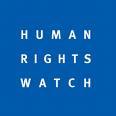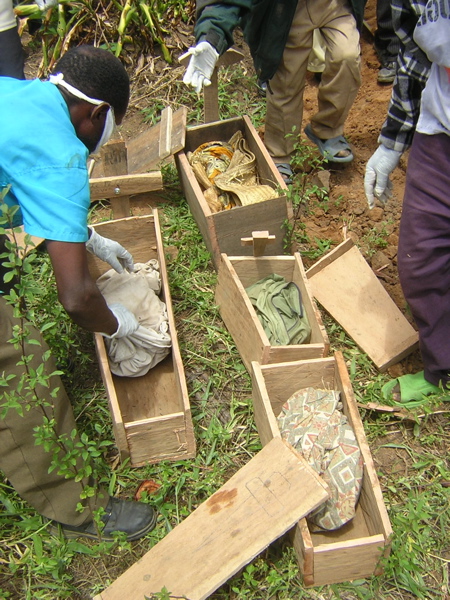Breaking news...

Merry Christmas. No Peace on Earth for DRC.
In a year-end report published today and based upon 23 fact-finding missions in the Democratic Republic of Congo (DRC), Human Rights Watch (HRW) has demanded that the United Nations Security Council "act urgently" to protect civilians from atrocities perpetrated by government and rebel troops. The Security Council should also act to ensure peacekeepers are not implicated in abuses, HRW said.
Over 600 victims and witnesses contributed testimony to the 183 page report, "'You Will Be Punished': Attacks on Civilians in Eastern Congo."

Image: Burial at Luofu © HRW
More than 1,400 civilians were brutally and deliberately murdered since January 2009 during two successive Congolese army (FARDC) operations against a Rwandan Hutu militia, the Democratic Forces for the Liberation of Rwanda (FDLR). In January the Congolese and Rwandan governments began joint military operations against the FDLR in a five-week operation known as Umoja Wetu. It was followed in March by a second military operation, Kimia II, conducted with the support of the UN peacekeepers.
Originally touted as a way to bring peace and security to eastern Congo after the ouster of Tutsi rebel leader Laurent Nkunda by wanted war criminal Bosco Ntaganda in January, quite the opposite has occurred. Human Rights Watch documented horrific crimes against civilians by the FDLR, the Congolese army, and, in some instances, the Rwandan army during the military operations. Human Rights Watch investigations link senior FDLR commanders and several Congolese army officers to some of the worst atrocities. Many of the abuses amount to war crimes and possible crimes against humanity, HRW said.
For those who can stomach descriptions of heinous brutality, partial testimony from the report follows:
A woman who was abducted by the FDLR during an attack on Busheke village in late January 2009:
"They [FDLR]...killed my husband with a machete and two of them raped me. They also killed my father and raped my mother and sister before killing them as well, all with machete. Ten other Hutu women and girls from my village were raped and killed with machete the same night. They abducted me and brought me to their camp where I was made the "wife" of Captain Jean Claude. He raped me every day until I managed to escape six months later... The FDLR said they were brothers of the Congolese Hutu and didn't understand why we had welcomed the FARDC. That's why they were punishing us."
Woman attacked by the FDLR in Nyakabasa village after the rebels killed her 25-year-old son in February 2009:
"I ran outside, and an FDLR [combatant] grabbed me and cut me everywhere with his machete. I was almost dead. He cut me on my head and on my arms. He wanted to cut my neck, but I put up my hands to block it... There were many combatants. Some were burning houses and others were killing people. They continued to beat me and left when they thought I was dead."
Another witness told Human Rights Watch, "When the FDLR came, they circled the entire village and started killing people. They stopped those who tried to flee with their own hands. They raped the women, even the young girls, and then they started to burn the houses. Some people who tried to leave their homes were stopped by the FDLR and thrown back into their burning houses, even the children. "The FARDC tried to fight back a bit, but the FDLR outnumbered them and a lot of FARDC soldiers were killed. The others fled into the forest. I came back the next morning and saw bodies decapitated, burned, and raped. I was scared so didn't stay for long.... The women were all naked so we knew they had been raped. Some of them were in their homes, others next to the houses. Some were killed by bullet and others by knife or machete. I saw two women who were pregnant, and the FDLR had cut open their stomachs and removed the fetuses from their bodies. The nine children's bodies I saw had all been burned. One of them was killed first with a knife... I left that day for Goma."
MONUC, the United Nations peacekeeping mission in DRC, is also held accountable for the disastrous results of the joint Congolese/Rwandan military operations.
MONUC has faced significant challenges in fulfilling this mandate. In March 2009 it joined forces with the Congolese armed forces to carry out the Kimia II military operations against the FDLR. But preparations for the operation were hurried, permitting little time for full reflection on how an international peacekeeping force could appropriately provide protection to civilians while backing a national army with a terrible human rights record. Well into Kimia II, the conditions around MONUC's involvement were not yet properly clarified and no concrete plan to provide protection to civilians at risk was in place. To make matters worse, MONUC lacked the necessary logistical resources and rapid response capabilities to effectively carry out its mandate to protect civilians, and it had trouble grappling with the fragmented and catastrophic conflict on the ground.
As far back as April 2009, there was legal controversy over whether or not the United Nations should have been involved in supplying logistical support to military operations. On Friday, Reuters reported that
In an internal memo, seen by Reuters on Friday, the United Nations' Office of Legal Affairs wrote to peace-keeping chief Alain Le Roy soon after the offensive began outlining the strict conditions under which MONUC could back the anti-rebel drive.
"MONUC cannot participate in any form of joint operation with (army) units, or support an operation by those units, if there are substantial grounds for believing there to be a real risk of them violating international humanitarian law, human rights law or refugee law," the memo said.
Clearly, human rights and civilian protection are non-sequiturs in DRC.
"Continued killing and rape by all sides in eastern Congo shows that the UN Security Council needs a new approach to protect civilians," said Anneke Van Woudenberg, senior researcher at Human Rights Watch. "The Security Council should send a group of experts to Congo to kick-start a serious civilian protection plan."
Whatever happened to Hillary Clinton's promises to train a 3,000 women police force?
If anyone thinks that the United States is off the hook, think again. The final report of the United Nations Group of Experts that was originally leaked to the press two weeks ago, is now available. The United States and China, among others, are cited for arms embargo violations and "irregularities," including but not limited to the delivery of a Boeing 727 aircraft by an American citizen, Mr. Tim Roman of Pennsylvania. Roman and his family are involved in mining operations in the United States and World Bank construction projects in the DRC. Roman has also been the private pilot for Congo President Joseph Kabila, and operates Wimbi Dira Airways which has been blacklisted by the European Union as unsafe and which has also been implicated in gunrunning and illegal weapons transfers.
The Group has continued to monitor compliance with the notification requirement incumbent upon all States of deliveries of military equipment and training to the FARDC. The Group has highlighted a number of irregular deliveries of military equipment and training from a number of different countries, including, but not limited to, the Democratic People's Republic of Korea and the Sudan, but also irregularities regarding deliveries and training by China and the United States... 286. At the time of writing, the Group has been unable to obtain information on the sale and export of this aircraft to the Democratic Republic of the Congo and requested further information from the Governments of the United States and the Democratic Republic of the Congo. The Group contacted Mr. Roman, who said that the aircraft was sold by his company in Pennsylvania to Wimbi Dira Airways in the Democratic Republic of the Congo, a company in which he serves as the Chief Executive Officer.
While news reports maintain that Nkunda's CNDP has "formally" integrated into the FARDC, it has retained most of its heavy weaponry. Parallel command structures and local taxation networks continue to operate under the CNDP faction loyal to General Bosco Ntaganda, who is now the deputy operational commander for Kimia II. Ntaganda is a war criminal, wanted by The Hague, and Congo President Joseph Kabila refuses to turn him over, perhaps because Ntaganda has gained control of mines in the region.
The faction loyal to General Nkunda "remains a singular force on the ground" and has not fully integrated into the FARDC. Nkunda's legal team has petitioned the Rwanda Supreme Court for a hearing. Nkunda has been held with no formal charges under house arrest in Rwanda since January.
Will it ever end?